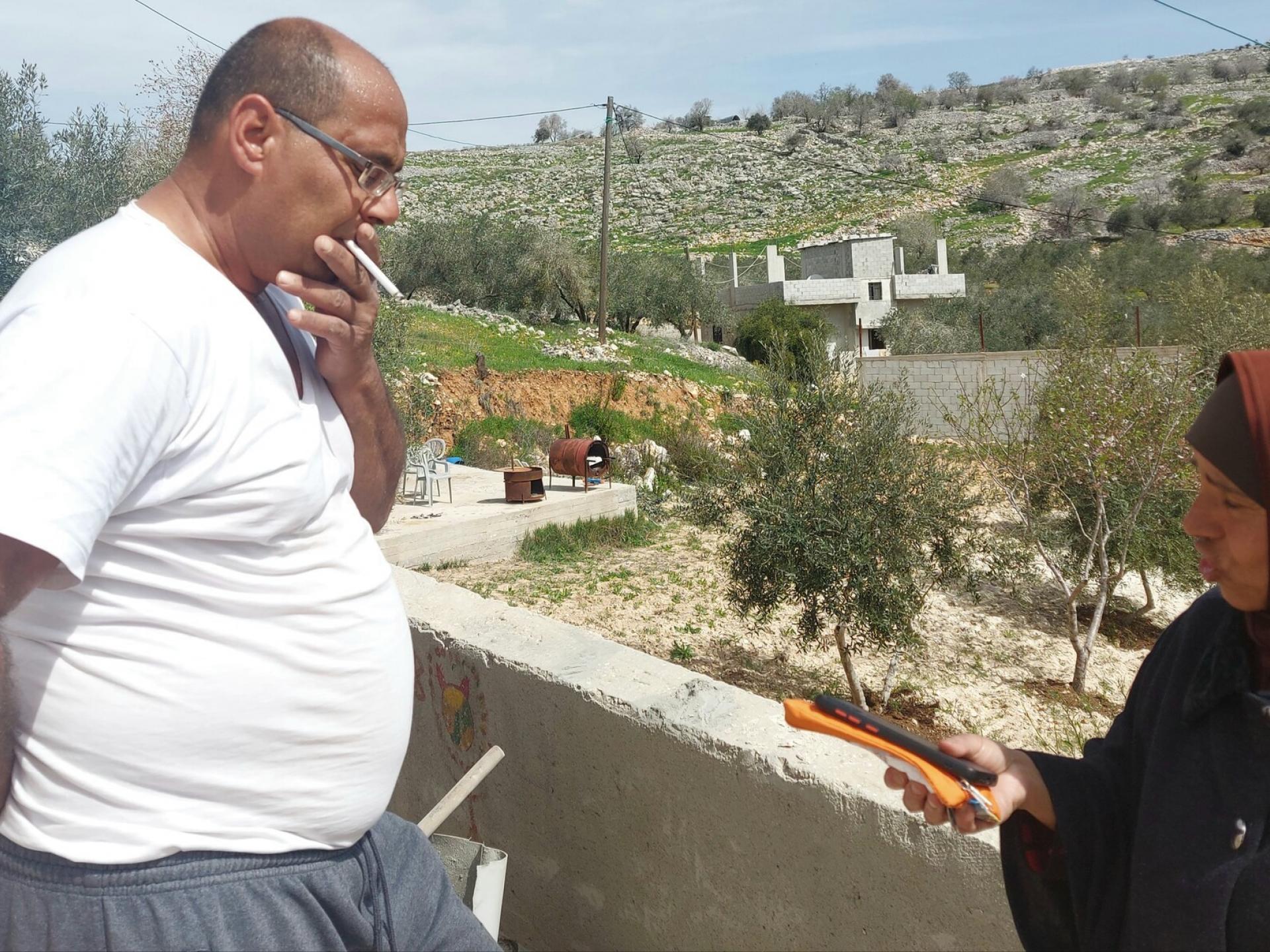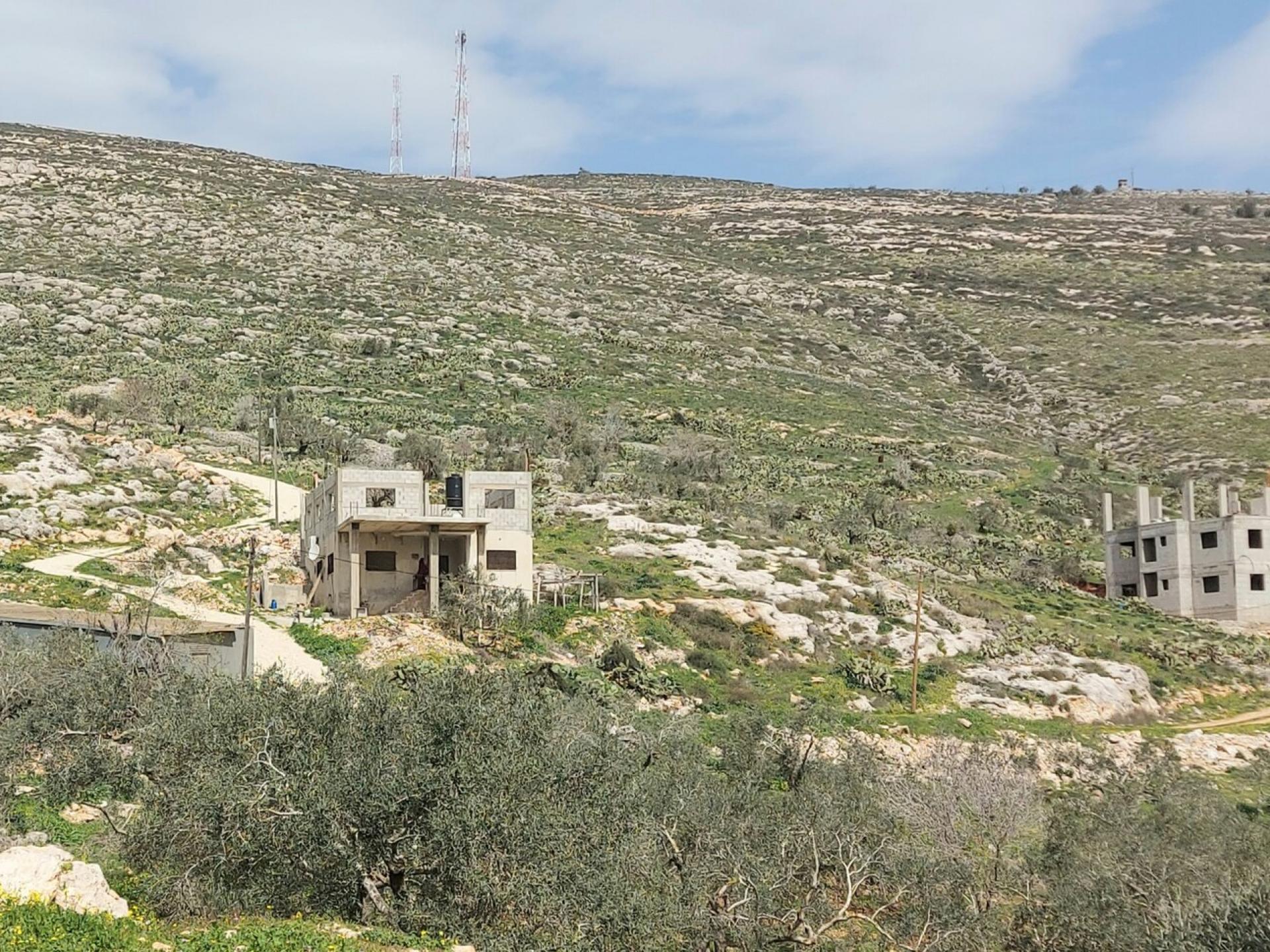Burin and Beita, both suffering from Jewish terror and from the army

We visited Burin and Beita, a village and a town, both suffering from Jewish terror and from the army.
Burin – A Palestinian village located in the valley north of Huwwara, near the settlements of Yizhar and Har Bracha, whose inhabitants frequently attack and harass the residents of Burin.
Burin has some 3000 residents, most of whom make a living from agriculture and grazing their sheep. A few work in Israel.
We met Doha, an active woman, full of energy, and her husband Bashar, on whose balcony they held a ceremony to celebrate the completion of planting olive trees on 4 February in which our members also participated.
Land belonging to the village has been expropriated a number of times to establish settlements and military bases. As a result the extent of its agricultural land and amount of water resources diminished. More than 2000 dunums have been declared state land and later transferred to Har Bracha – all in the name of state security.
In 2015 masked persons from Yizhar invaded Burin, threw rocks and set fire to fields. Soldiers who were present did nothing to protect the Palestinians.
In 2017 masked persons again invaded the village and threw rocks at the homes and at people. There’s no point in quoting the response of the IDF spokesperson…we stopped believing them long ago.
In 2018 about 100 old olive trees were cut down. Graffiti on the stone wall read, “And you bequeathed…”
In 2019 Israelis who had come to help with the olive harvest were attacked. Some were beaten with iron rods and injured.
That’s a partial list – the picture is clear. Confrontations daily, and the Palestinians learned there’s no point complaining to the army or the police since they do nothing and the settlers are never apprehended.
Inhabitants of the Har Bracha communal settlement created paths allowing them to easily reach every location. They send camera drones that frighten the children.
drones that frighten the children.
Water – they’re supplied by Mekorot, but with many interruptions between distributions.
The outermost homes of Burin suffer from settlers coming with dogs and guns. Bashar says they’re chased off with rocks and sticks. He points from his balcony at burned olive trees. He shows us a shed they erected on a hilltop as a meeting place for Burin residents, but the settlers stole and re-erected it on their property.
We met the woman who owns one of the buildings on the edge of the village. She and her son built it but she hasn’t moved it because she fears the settlers who come frequently.
We parted from our hosts and continued to Beita, via Huwwara, stopping of course, briefly, for knafe.
We met Musa, the head of Beita municipality.
In 2021 the Evyatar outpost was established two kilometers from Beita. It was built following the attack at Tapuach junction where Yehuda Gu’eta was murdered. From the time Evyatar Borovsky, a Yizhar resident, was murdered there in 2013 the settlers had been trying to establish an outpost. In less than two months the settlers managed to erect about 50 structures in the outpost, pave paths, establish a playground, a synagogue, a bet midrash and other sites, and bring dozens of families to live there. Everything was done without authorization from either the government or the army. Civil Administration inspectors issued demolition orders for all the structures. Since then a number of additional structures have been erected which haven’t yet received demolition orders. In 2021 the OC of the IDF Central Command ordered the evacuation of the entire outpost.
Residents of Beita demonstrate against the outpost every Friday and continuously occupy a protest tent during the week.
They collect all the types of grenades that are fired at them and hang them on the fence as memorials. The army, as usual, employs tear gas, “rubber” bullets and live ammunition. Occasionally the army declares the location to be a closed military area. Youths from the village throw rocks at the soldiers who arrive each week to plow up the path from the village to the demonstration site in order to prevent vehicle access. Youths arrive on foot, but access is difficult for the medical personnel.
In February Mandelblit decided to permit a settlement to be established on the site of the outpost. And why not? Residents of Beita increased their demonstrations; the army appears each Friday and opens fire.
We met Musa at the municipality. Beita has 15,000 residents. On 2 May 2021, the army murdered ten people during Friday’s unrest. Since the demonstrations began, 5400 residents have been injured! They don’t stop demonstrating because they won’t give up their land. Sometimes they add nighttime harassment such as burning tires and employing lasers on the slope of the settlement. Even though the settlers have left Evyatar the structures erected still stand, as well as a large wooden Magen David.
Musa tells us that in 2019 settlers attempted to go up a hill where Roman antiquities are found. Two Palestinians were killed in the confrontation. Residents of Beita built new homes up to the antiquities site and since then the settlers haven’t returned. A small victory.
Water – They’ve received 1400 cubic meters of water from Mekorot since 2006. There’s been no increase, despite population growth. They have a permanent shortage of water. There’s a Mekorot pumping station in the area. One day the water supply stopped. A municipal employee went to determine why there was no pressure. Without warning he was shot – murdered by the army. In Nablus there’s a well belonging to the municipality from which Beita buys tankers of water on days Mekorot doesn’t supply what’s needed.
There are two entrances to Beita. The army is trying to close the entrance from Awarta – Odela (to the northwest). It will be easier for the army to control a single entrance.
Theft of land. The construction of the Huwwara bypass road, for the benefit of the settlers, led to Israel expropriating 900 dunums from Beita alone. It stole land from all the villages in the area. Moreover, Palestinians are forbidden to build on both sides of the paved road. That’s hundreds of additional stolen dunums.
On the way back, almond trees, anemones and narcissus make us forget the ugliness of what occurs here.





